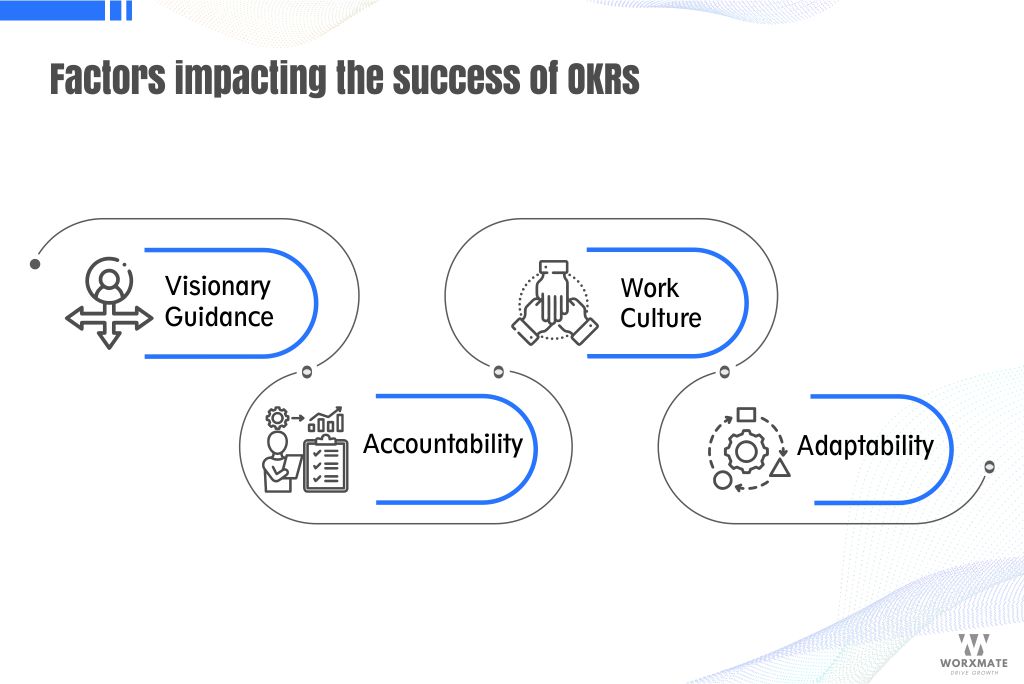- Product
Product Overview
Deep AI
Define, execute, evaluate and plan your OKR journey
OKR Solution
Discover focus, alignment and celebrate success
Performance Management System
Manage, Evaluate, and Increase Employee Performance
Task Management
Prioritize, plan, and deliver tasks effectively
Join leading organizations relying on Worxmate for efficient OKR management and success
Personas
CHRO
Optimize HR functions with our AI-driven performance management
CEO
Explore strategic leadership insights and best practices for CEOs
Strategy Head
Drive strategic excellence that fuels innovation & success
Product Head / CPO
Empower product leadership with goal alignment
Marketing Head
Empower Your Marketing Teams to Drive Growth, ROI, and Brand Impact
Sales Head
Maximize sales performance by data-driven decision making
L&D Head
Empower L&D Teams to drive growth and employee success
- OKR Consulting
- Pricing
- About Us
- Resources
- Contact Us
The Role of Leadership in OKR Failures
- March 15, 2024
- 7 min read

In recent times, Objectives and Key Results (OKRs) have garnered substantial attention as a resilient goal-setting method adopted by numerous organizations globally. This methodology, popularized by industry giants such as Google, promises enhanced alignment, transparency, and focus within teams, ultimately driving superior performance.
However, despite its potential benefits, OKRs occasionally fall short of expectations, leading to organizational frustration and underperformance. While various factors contribute to these failures, the role of leadership emerges as a critical determinant. Effective leadership is fundamental in guiding the implementation and execution of OKRs, yet its absence or misalignment can significantly impede success.
This blog post delves into the complex connection between leadership and OKR failures. We’ll uncover how leaders play a crucial role in creating an environment where OKRs can thrive. So, let’s shine a light on how leaders can pave the way for OKR success and keep teams on track toward their goals!
» Deciphering the Core Principles of OKRs
Objectives and Key Results (OKRs) represent more than just a goal-setting framework; they embody a fundamental shift in organizational culture toward transparency, alignment, and accountability. At its core, OKRs provide a structured approach to defining and achieving objectives, emphasizing clarity, ambition, and measurable outcomes.
The essence of OKRs lies in their ability to foster a shared understanding of priorities and empower teams to focus their efforts on what truly matters. Unlike traditional goal-setting methods, OKRs emphasize aspirational objectives that push teams beyond their comfort zones, coupled with measurable key results that serve as tangible indicators of progress. This combination of ambition and accountability fuels motivation and drives continuous improvement within organizations.
Moreover, OKRs promote transparency by making goals visible and accessible to all levels of the organization, fostering alignment and cohesion toward a common purpose.
By regularly tracking progress and adjusting objectives as needed, OKRs enable organizations to adapt swiftly to changing circumstances and stay agile in today’s dynamic business environment. Thus, the essence of OKRs lies in setting goals and creating a culture of clarity, ambition, and accountability that propels organizations toward success.

» The Leadership Conundrum:
Here’s where things get interesting (or messy, depending on how you look at it). Imagine this: a company jumps on board the OKR train with boundless enthusiasm, convinced that these goal-setting methods are the secret to achieving unprecedented success.
But as time goes by, the cracks start to show. Objectives must be more specific and inspiring; key results must be more relevant and progress towards goals. Well, let’s say it’s nowhere to be found. So, what gives?
Enter leadership—or, more accurately, the lack thereof. You see, OKRs aren’t a magic bullet that works wonders all on their own. They require firm, committed leadership to guide and steer the ship toward success. And when leadership falls short, well, that’s when OKR failures rear their ugly head.
» The Leadership-OKR Dynamic:
So, how exactly does leadership impact the success (or lack thereof) of OKRs? Let’s break it down, shall we?
- Visionary Guidance: At the helm of every successful OKR implementation is a visionary leader who sets the tone, communicates the vision, and inspires teams to rally behind common objectives. Without this clear direction and buy-in from leadership, OKRs can quickly become a free-for-all, with teams floundering aimlessly.
- Accountability Matters: Effective leaders understand the importance of accountability in driving results. They hold teams accountable for their OKRs, providing support, resources, and guidance along the way. But when leadership fails to prioritize accountability or—worse yet—turns a blind eye to lackluster performance, OKRs lose their teeth and become nothing more than a meaningless exercise.
- Culture Clash: Have you ever heard the saying, “culture eats strategy for breakfast”? Well, the same holds true for OKRs. Even the most meticulously crafted objectives and key results will fall flat if they’re at odds with the organization’s culture. It’s up to leadership to foster a culture that values transparency, collaboration, and agility—the very ingredients that fuel OKR’s success.
- Adapt or Perish: Here’s the thing about OKRs: they’re not set in stone. They’re meant to evolve and adapt as circumstances change. And that’s where leadership comes in. Effective leaders know when to pivot, when to double down, and when to call it quits on a particular objective. But when leadership is inflexible or unwilling to course-correct, OKRs become rigid, outdated relics of a bygone era.
» Leadership’s Role in Overcoming OKR Failures
The role of leadership in mitigating OKR failures is pivotal, as they navigate the challenges and pain points that can arise in implementation. Let’s delve into these hurdles and explore how leadership can steer the ship toward success.
| Challenge | Solution | |
| Lack of Clarity and Alignment | One of the most common pitfalls in OKR implementation is a lack of clarity and alignment. When objectives are ambiguous or misaligned with broader organizational goals, teams can veer off course, leading to frustration and disengagement. | Leadership plays a critical role in providing clear direction and ensuring alignment between OKRs and the organization’s strategic vision. They must communicate effectively, clarifying objectives and illustrating how each team’s efforts contribute to overarching goals. Regular check-ins and feedback sessions can help realign priorities and keep everyone on the same page. |
| Overly Ambitious Objectives | Setting overly ambitious objectives can set teams up for failure, demoralizing them rather than motivating them to excel. Unrealistic expectations can breed a culture of fear and risk aversion, stifling innovation and creativity. | Leadership must strike a balance between setting stretch goals and ensuring they are achievable. By fostering a culture of psychological safety, where failure is viewed as an opportunity for learning and growth, leaders can encourage teams to push boundaries without fear of reprisal. Regular calibration sessions can help teams recalibrate objectives based on feedback and performance data. |
| Lack of Accountability | Without clear accountability mechanisms in place, OKRs can become little more than aspirational statements, lacking teeth and urgency. When individuals and teams are not held accountable for their progress, momentum stalls, and objectives remain unfulfilled. | Leadership must establish clear accountability structures, assigning ownership for each objective and holding individuals and teams responsible for their outcomes. Regular progress reviews, with transparent reporting on key metrics and milestones, help keep everyone accountable and foster a sense of ownership and responsibility. |
| Resistance to Change | Implementing OKRs often requires a cultural shift within the organization, which can meet resistance from entrenched habits and processes. Without buy-in from leadership, employees may view OKRs as just another management fad, rather than a valuable tool for driving performance. | Leadership must champion the OKR process, demonstrating its value and commitment to its success. By leading by example and actively participating in the OKR process, leaders can inspire confidence and overcome resistance. Providing training and support to employees, and soliciting their input and feedback, can help ease the transition and foster a culture of continuous improvement. |
| Lack of Resources and Support | Successful OKR implementation requires adequate resources, including time, budget, and manpower. When teams are stretched thin and resources are scarce, achieving ambitious objectives becomes increasingly challenging. | Leadership must ensure that teams have the necessary resources and support to execute their OKRs effectively. This may involve reallocating resources, prioritizing initiatives, or providing additional training and development opportunities. By investing in the success of the OKR process, leaders demonstrate their commitment to organizational growth and performance. |
Leadership Through OKRs: A case study
LinkedIn, like many successful companies, leveraged the OKR framework, contributing to its rapid growth into a $20 billion enterprise. The leadership of LinkedIn emphasized the pivotal role of clear direction in business success, asserting that a well-defined vision and mission were essential for reaching significant milestones.
According to the CEO, effective leadership involves providing guidance, coaching, and setting clear objectives with measurable results. He believed that OKRs should be time-bound and challenging, motivating teams to strive for ambitious goals. They recommended limiting the number of OKRs to between 3 to 5 per quarter to maintain focus and clarity.
In tracking OKR’s progress, the Leadership team implemented a weekly three-hour meeting and a full-day meeting once a quarter to engage with employees. These sessions provided a platform for employees to share their achievements and progress toward business objectives, fostering alignment and accountability. The Leadership team’s approach emphasized transparency, collaboration, and continuous improvement as key drivers of LinkedIn’s success.
So, what’s the takeaway here? Well, it’s simple. Invest in leadership if you want to avoid the pitfalls of OKR failures. Cultivate leaders who embody the core values of OKRs—vision, accountability, adaptability, and cultural alignment. Because, at the end of the day, OKRs are only as good as the leaders who champion them.
Conclusion
In unveiling the role of leadership in OKR failures, it becomes evident that, while they are formidable tools for achieving organizational success; they are not panaceas. They possess the potential to yield remarkable results when utilized adeptly, but their effectiveness is contingent upon strong leadership. With is becoming futile, the end can only be avoided with guidance, trapping organizations in a perpetual cycle of disappointment.
It’s essential to recognize that OKRs require more than mere implementation—they demand strategic oversight and navigation by leaders who understand how to leverage them effectively. Leaders are like guiding lights that show how to achieve success with OKRs. They help teams get on the same page, create a vibe where everyone feels responsible for their work, and ensure our goals are meaningful and challenging.
They wield the power to harness the full potential of OKRs, transforming them from mere targets into catalysts for organizational growth and excellence. Thus, organizations must heed the crucial role of leadership in navigating the complexities of OKRs and charting a course toward sustainable success.
Struggling with OKR implementation? Transform your organization’s approach to OKRs with Workxmate’s comprehensive OKR solution. Streamline goal-setting, enhance team alignment, and ensure accountability with our intuitive tools. Take the first step toward OKR success today! Explore Workxmate’s Best OKR Software!
Share this article:

